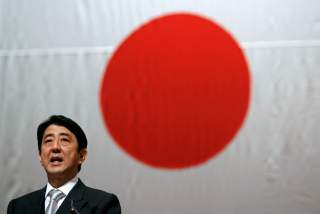Japan Seeks to Neutralize the Threat of a China-Russia United Front—And It's Not Working
Tokyo wants to make sure a Russian-Chinese alliance never emerges to threaten Japan, but giving Moscow a pass won't accomplish that.
Overall, Japan’s casual attitude to the threat posed by Russia demonstrates the extent to which Japanese strategists are fixated on China and North Korea, and struggle to appreciate that developments beyond their immediate region also affect Japanese security. At the same time, Tokyo’s pursuit of closer ties with Russia is a consequence of Japan’s heightened insecurity, which Western countries, and above all the United States, should work harder to alleviate.
James D.J. Brown is associate professor of Political Science at Temple University Japan.
Image: Japan's Prime Minister Shinzo Abe addresses cadets during a graduation ceremony at the National Defense Academy of Japan in Yokosuka, south of Tokyo, March 18, 2007. REUTERS/Kiyoshi Ota (JAPAN)

